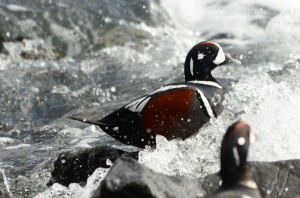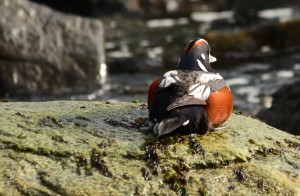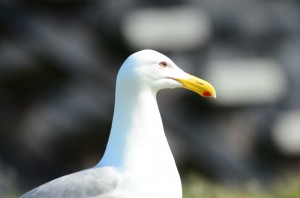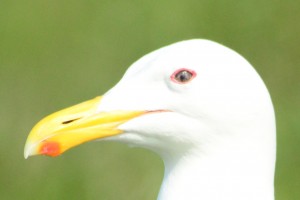There was a large roar made by ocean swells breaking and surging on the west and southwest sides of the island, at first light today. Winds abated and light southwest to west winds in the morning turned to light west in the afternoon rising to 15 to 20 knots by evening. The sky cleared by noon and stayed that way until dusk. The barometric pressure continued Monday’s trajectory, rising above 1022 hPa by mid-afternoon and holding there into the evening.. The marine forecast calls for light winds Wednesday and a few days of sunshine.
Four whale watching vessels were observed working in the Protected Area today. All four vessels went around to the outside (south) of South Rock to observe the seals, sea lions and eagles. One sports fisher was observed travelling through the reserve and dip-netting fish near the Rosedale Reef buoy. Forage fish, possibly herring seemed to be boiling up to the surface their drawing numerous eagles, gulls and cormorants.
An Articulated Tug and Barge (ATB), (barge, a loaded oil tanker), was noted outbound, this morning. When we checked for a vessel name on the Automated Information System (AIS), http://www.marinetraffic.com/en/ais/home/centerx:-124/centery:48/zoom:10 it did not show up on the marine traffic system neither did the tug attached to it as a pusher.
A report to the BC Ministry of Environment on the risk of oil spills in BC waters (http://www.env.gov.bc.ca/main/west-coast-spill-response-study/)states that barges are not required to use AIS however their tugs should register. The report goes on to say that a spill from an ATB could exceed 25,000m3 of oil. Fuel barge movement statistics provided by Canadian Coast Guard Marine Communications Traffic Services to the 2013 BC report show over 1000 fuel barges outbound from Victoria, Vancouver, Comox and Prince Rupert and another 514 transiting Victoria alone. Why are they not required to register? There have been several near-miss incidents with these oil carriers; why not use every means possible to maximize safety and reduce risk, such as AIS?
To put things in context, a show of force was led by the USS Shoup heading out to sea, followed an hour later by a very large submarine escorted by a convoy bristling with military might and expense. The usual explosions from Rocky Point put the ar in arsenal.
Ecologically, the gulls are becoming more abundant and settled in their nesting spots. Territorial disputes are a daily occurrence now as are the calmer moments of pairs just standing together gazing at and grooming each other. The Harlequin Ducks have been busy with all the whitewater activity and take their rest on the boulder beach just southeast of the main house. Pigeon Guillemots were back for a morning visit to Great Race.
Sea lions and Harbour Seals had really good daytime sleeps today recovering from the storms.
Temporary repairs were completed on damaged roofs, as was clean-up and mopping up from the storm.
- Whitewater birds, Harlequin Ducks swim underwater using their wings like an alcid or a dipper.
- Male Harlequin rests on boulder with nori growing on it.
- This Glaucous-winged Gull has almost yellow eyes.
- The colour changes in the light and the same gull’s eye here looks more mottled and golden.



